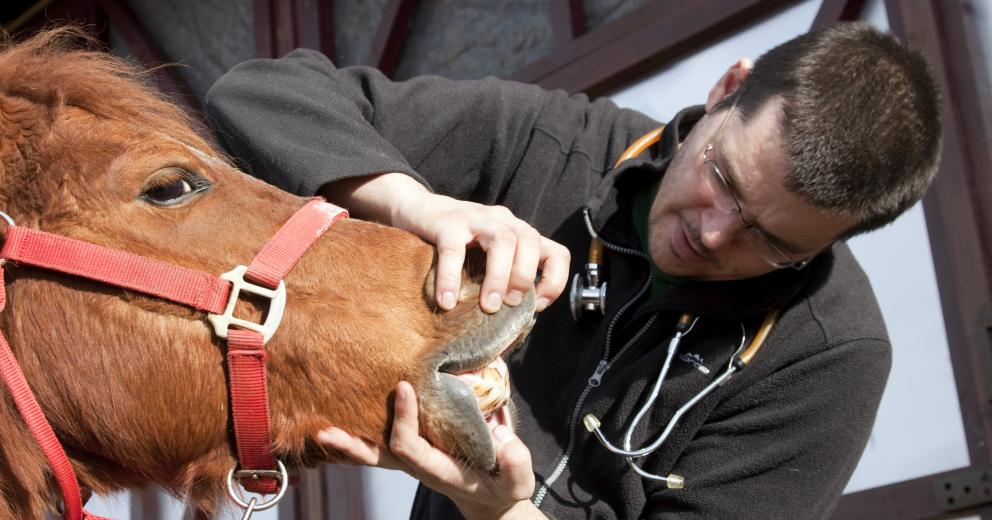You are here
Equine Pre-Purchase Exams

The pre-purchase exam: A wise investment
Buying a horse can be a difficult decision. Horses seldom come with money back guarantees, so it's important to investigate before you buy. Although many horse professionals can give you an opinion on performance or breeding ability, a veterinarian will give you the best information on overall health and condition. Your veterinarian can conduct a pre-purchase examination to give you this information.
A pre-purchase exam is like a still photo. It provides information about an individual horse on a given day at a particular moment. How accurate and complete that picture is depends on the exam findings and what problems actually exist. Many factors contribute to a horse's past, present and future health, and a still photo cannot provide the whole story. However, the information revealed by the exam can be very valuable. Ultimately, avoiding the purchase of an unsuitable horse will save much disappointment and many dollars.
What do you get from the exam?
Ultimately, your veterinarian will help you with a risk analysis and evaluation of the horse for a particular function. Your veterinarian will therefore recommend different types of exams depending on the intended use of the horse. For example, a mare being bought as a brood mare will require a thorough reproductive evaluation. A gelding being considered as a 2-year-old racehorse will need a comprehensive physical exam that includes a battery of lameness tests.
Talk to your veterinarian
Your pre-purchase exam should be custom tailored depending on the future use you intend. There is no standard protocol; you and your veterinarian must decide what is needed. Here are some guidelines to help you communicate with your veterinarian:
-
If you don't have a regular veterinarian, choose a veterinarian who is familiar with horses or, if possible, familiar with the breed, sport or use for which the horse is being purchased.
-
Explain to your veterinarian your expectations and primary uses for the horse, including short and long term goals (for example showing, then breeding).
-
Ask your veterinarian to outline the procedure that he/she feels should be included in the exam and why.
-
Establish the costs for these procedures.
-
Be present during the exam. The seller or agent should also be present.
-
The information from the examination is for your use only (buyer), unless you state otherwise.
-
Don't be afraid to ask questions or request further information about your veterinarian's findings.
What might be included?
Because every exam can be different, you will need to talk to your veterinarian to determine what should be included in your horse's exam. However, your veterinarian
may include the following:
-
A review of the horse's medical history with the owner/agent, including vaccination and deworming schedules, feeding, and any supplements or drugs
-
Monitoring pulse, respiration and temperature
-
Listening to the heart and lung.
-
Checking the nostrils, ears, eyes
-
Palpating limbs and body parts
-
Drawing blood samples for EIA (Coggins), medications or other tests (with the owner's knowledge)
-
A basic oral exam
-
Testing the feet, hooves, joints
-
Watching the horse travel in a straight line, in small circles at a walk, trot and canter
-
Observing the horse's behaviour
Further tests
The preliminary examination may alert your veterinarian to potential problems. If your veterinarian suspects something that may interfere with the horse's intended use, he or she may recommend further tests. These may include x-rays, urine and blood analysis, and endoscopic and ultrasonic examinations. These additional tests are generally used to confirm a diagnosis and provide a clearer picture of the seriousness of the problem.
These tests may be chosen by the buyer or recommended by the veterinarian. They will result in additional charges over and above the exam costs. If you decide to decline any further tests that are recommended, your veterinarian will note that for the record.
Understanding the results
You need to thoroughly understand your veterinarian's findings in order to make an informed decision about your prospective purchase. If you don't understand an evaluation or a rating, ask questions until it becomes clear. Keep the following points in mind when you discuss the results with your veterinarian:
-
No horse is perfect.
-
Some medical conditions or conformation faults are manageable or may never affect the horse's performance.
-
Learn what management options may be needed and decide whether they are practical for your needs and budget (for example specialized shoeing, exercise or nutrition).
-
Make your own determination as to whether a horse is a good investment based on all the available information.
Making the decision
Remember, the decision to buy is yours alone to make. Your veterinarian can be a valuable partner in the process by providing you with objective, health-related information. The final decision, however, rests with you.
Sometimes adding up the positives and negatives can help you make a balanced decision. On a sheet of paper write the horse's name and the price. On the right side list the good things about the horse; in the left column list all the negatives. Add up the positives and subtract the negatives, and you will probably have your answer.
Even if you decide not to buy the horse you had examined, consider the exam money well spent. The investment can save you headaches, heartaches and dollars. Not buying that particular horse gives you the opportunity to find a horse that is healthy and meets your needs and expectations.
REMEMBER: The veterinarian is working for the BUYER in a manner that respects the horse and the seller.
